There is something about wilderness which attracts us. Maybe, living in a concrete jungle with predatory humans for company, the tree filled jungles where real predators and their prey remain in harmony seems a better option. Of course, being a city dweller since birth and knowing nothing of rural life, I wonder if I will be able to live happily in a village for more than a few days. All the same, it is wonderful to get away from the sea of humanity during the holidays, and we are always on the lookout for a place which will take us far from the madding crowd. This time, all our wishes were fulfilled when we spent the best 48 hours of our Christmas vacation at K.Gudi near Chamrajnagar (Karnataka).
We started from Ooty early in the morning, and weaved our way along the highway which passes through Masinagudi, Mudumalai and Bandipur. (If any of you are planning a similar trip, it would be a good idea to combine a visit to the sanctuary along with the journey towards Mysore). Since we had already been on the jungle safari earlier, we did not stop, but went on with our journey. We were, however lucky to see some herd of deer on the way. I found myself with better shots of the deer this time, than on our jungle safari! The journey from Ooty to K.Gudi took us about 3 ½ hours.
K.Gudi expands to Kyatadevara Gudi, named for a tribal deity who has a temple here. This is a small hamlet about 20 Kms from B.R.Hills.
This place is a discovery of the erstwhile Maharaja of Mysore, who found it a convenient location to build a hunting lodge. This structure stands here till date, of course, after some renovation, and is now the main reception and office of Jungle Lodges and Resorts, who have built one of their eco-friendly lodges here.
The Mysore Maharaja's Hunting Lodge
Today, this place is part of the BRT Wildlife Sanctuary – the Belligiri Rangaswamy Temple Sanctuary – and is one of the few places in India where you can stay inside the sanctuary itself, with the full permission of the concerned authorities. Right opposite the lodge is the forest department guest house, also an old structure, now renovated, but dating back to the British era, believed by some to be haunted!!!!
The Forest Rest House
We were welcomed on our arrival at the resort by Mr. Narayan, who is the naturalist at the resort. One who grew up in a village on the banks of the Kabini, Narayan has a close relationship with the flora and fauna of the area and was extremely helpful as well as informative. Samhith was thrilled to hear that we would be leaving after lunch for our first jungle safari, and that we would be going for one every morning and afternoon. However, what captured his attention was a pair of elephants in the lodge, one of which was bathing in a lake just outside the resort. It was the first time that I saw an elephant bathing, and it was a wonderful sight. I couldn’t stop taking photographs!!!
There are about 8 tented cottages and 3 log huts available at the resort. There are also a few well appointed rooms at the hunting lodge which also houses the main office. We had tried to book one of the log huts, but even more than 3 months back, they were all booked, and we had to settle for the last tent available. However, staying in the tented cottage itself was a wonderful experience. Two cane chairs outside beckoned us, and inside, it was roomy and contained a double bed and a couple of tables and clothes-hanger. A door behind the tent led to a large bathroom. Very basic, but sufficient and comfortable. We were warned to strictly keep the door closed at all times, for the area was full of monkeys who wouldn’t hesitate to take over our room at the slightest chance.
We were ready at 4 PM after lunch and a short siesta for tea and an introductory talk given by Narayan. He spoke about the lodge, its history, and the kind of animals that made the forest their home. He was very clear, and emphasized that we wouldn’t see all the animals, but only some, and that too, with a bit of luck. An interesting and encouraging thing was a list on a whiteboard right outside, which listed all the sightings of animals in the last 2 weeks. It was extremely encouraging to note that leopards had been seen no less than 6 times, and a tiger had been sighted twice. He specifically asked everyone present not to use the flash during taking photographs. It was only then that I realized that I had no idea how to switch off the flash in my camera, and he happily obliged. We set off in an open jeep for the safari.
I suppose the most important factor in a safari is luck. We saw a number of deer – spotted deer (Chital), barking deer and Sāmbhar. However, the most interesting animal we saw was a herd of Bison (Gaur). They were returning from a water hole, and obliged us by standing still for a few minutes. Lady luck parted from us at this point, for we just missed seeing a couple of leopards which were seen by people in the jeep before us. The driver alerted our driver through the wireless, but by the time we reached the place, they were gone, and didn’t return.
Sambhar
Gaur....
We returned from the safari, feeling cold to the point of shivering. Coming from Ooty, we felt that it wouldn’t be too cold, and we could bear the slight chill, we had neglected to carry our woolen clothes for the safari. The temperature in the higher reaches of the forest soon chilled us to our bones, and we decided never to venture out again without sweaters. Tea and snacks at the lodge proved to be welcome, and a documentary on the Cobra kept us entertained.
Incidentally, I must mention that the lodge is powered by solar power, and in the winter, thanks to the sun being invisible most of the time, electricity is limited, and is confined to the times of absolute necessity. The lights come on in the morning at 6 AM, acting as a wake-up call, and stay just long enough for us to get dressed and ready for the morning safari. After that, the electric supply is restricted to the office. Every evening, the lights come on at 7 PM, when a wildlife documentary is screened, and stays on till 9 or 9:30 PM. The geyser and the main light are operated centrally, so as to minimize wastage. We had to use the power supply in the office for charging my camera batteries and chose to leave our cell phones un-charged. We thus were totally unreachable, a wonderful feeling!
We were woken up the next morning by the light coming on at 6 AM, followed almost at once by one of the staff with hot tea and coffee. In a few minutes, we were dressed, and ready for our second venture into the forest. This time, we were welcomed by a mother and baby elephant, who moved closer to the bushes as we approached, but otherwise showed no great fear of us, the two legged creatures, aliens in their land. We only saw a few other deer on this trip, and returned rather disappointed to the lodge.
Breakfast was ready when we returned, and we happily tucked in, surprisingly hungry, for we hadn’t done anything but sit in the jeep! At 9:30, we were told to go to the lake, where we would go for an elephant ride, the next programme on our itinerary. We had to wait for our turn, for there were a number of youngsters who had hastened there, looking forward to the ride. Samhith was getting restless at the long wait, and they volunteered to take him along, at which he was absolutely thrilled! He went with a family with a number of kids, and was rewarded with the sight of a snake slithering into a hole. We went next, and he came along with us too and excitedly pointed to the place where the snake had disappeared, but we were not as lucky, and the snake never re-appeared.
We hung around the lake for some time after the ride, looking at the various birds which came looking for fish, and we noticed a Brahminy kite flying overhead. After a few trials, I managed to take a photograph. How do I know the name of the kite? Well, in the resort, every cottage is marked, not by a number, but by a board with a bird on it. Well, our tent had the Brahminy kite on it, which is why I was able to identify this one bird at least.
Our next expedition was to the temple which lends its name to the whole range of mountains, and also to the sanctuary – the Belligiri Rangaswamy temple. This temple in BR Hills is 20 Kms from K.Gudi, and we went by jeep through the highway which wends its way through the jungle. Just before we started, there was a commotion among the monkeys and heard some noise which, we were told was the alarm sound of the barking deer. It meant that there was a predator nearby. We went looking for it, but were unlucky once more, and decided to go straight to the temple.
This temple is dedicated to Lord Vishnu in the form of Rangaswamy in a standing posture. It is believed that this idol was installed by Sage Vaishtha and some other rishis. Ages ago, a devotee felt that the lord’s feet would hurt since he resided in a thick jungle and decided to offer him sandals. This has, over time, become a custom here, and there are a pair of sandals (Padukas) beautifully decorated with zari and semi-precious stones offered to the lord by his devotees. Another, older pair is kept outside and is used to bless devotees by placing them on his/her head. The name Belligiri comes from the word “White Mountain”, for the stone on which the Lord rests is white.
After lunch, it was time for a safari once more, and we started, taking care to wear our sweaters this time. We hadn’t been in the jungle for even 15 minutes, when we came across a female elephant. She was standing among the bushes near the road, waving her trunk to and fro. To our surprise, our driver totally stopped the jeep, and we saw another jeep approaching from the opposite side of the road. Neither jeep tried to move, which kept us wondering, till we saw the elephant charge towards us. The driver was obviously expecting this, for he moved backwards, which seemed to reassure her. She then tried the same thing with the other jeep, and they too moved backwards. We wondered why she was so agitated, but then we saw a baby elephant approaching from the bushes. So this was the mother and baby we had seen in the morning, and now we saw how protective the mother was, of her baby, as she gently guided her child towards the other side of the road, flanking him/her first on this side and then the other, pushing him/her forward all the time. It made me think of Samhith and how I still have to help him cross a road, guiding him, making sure he doesn’t get hurt, keeping my eyes watchful. A mother after all, is always a mother, whether human or animal. I was happy to have seen this touching scene, for we didn’t see many more animals on this trip, except the inevitable deer.
A Barking Deer
This evening, the documentary was a feature shot at Nagarhole, and it mainly concerned elephants, and how modernization and take over of forest land has affected them. I couldn’t help think of the mother-child pair we saw, and wondered what would become of them. The falling temperature made us move towards the campfire, which is lit every evening before dinner, in a small area adjoining the hut where lunch and dinner are served.
The next morning would be our last at the resort, and we woke early for our jaunt into the jungle. Shankar had opted to go for a trek rather than the safari, and I headed with Samhith towards the jeep. If only Samhith was a little older, we too could have gone for the trek! I wish he would grow up soon!!! By this time, I had given up all hopes of seeing anything interesting in the forest. We were so bored of seeing deer, the driver no longer stopped for us to take photos when we came across a herd. Now Samhith can identify not only the spotted deer, but also Sāmbhar as well as barking deer. We had already seen a number of wild boar in the resort, but this time, we came across a large group with some of the biggest ones we had seen so far.
However, there were two interesting things we came across this time. The first was a herd of elephants which included the mother-child pair we had seen the day before. Apart from them, there was an old elephant, obviously the matriarch of the herd, another female, and a lone male which had huge tusks. They weren’t too scared of us this time, probably because they were in their group and felt secure, but the matriarch kept an eye on us as she munched on the grass, and the mother gently pushed her child towards the bushes.
The only other interesting thing we saw on this trip is something I had never seen before – pugmarks of a leopard. We saw them on the mud-path on which the jeep moves, and the driver maneuvered his vehicle so that we wouldn’t erase them. While this time we felt lucky to see the tracks of the animal, the creature itself was elusive, and refused to appear before us. Well, we shall just have to try some other time.
While we didn’t really see many animals, this has been the closest to a real jungle I have ever been to. And what a jungle!! As Narayan himself informed us, this range of mountains is part of the migratory path of the animals from the Eastern to the Western Ghats, and sees a number of animals making this transit. Besides, the sanctuary covers a vast region comprising mountains of different altitudes and valleys. The kind of flora and fauna seen here is amazing! While I am no expert and can hardly identify the various kinds of trees, even to my un-informed eyes, there is a variety in the landscape that I have never seen elsewhere. While some areas are full of bamboo and other tall grasses, some higher reaches are covered with trees like the eucalyptus. Some trees are green and have gaily covered flowers, in some areas, the flame of the forest is the only tree seen for miles. Some trees have red and yellow leaves which have just started to fall, while some others have completely shed their leaves, and stand bare, their silhouette showing up clearly against the rising/setting sun.
I have brought back memories galore of my two days at this wonderful resort. Here are a few more photographs of this memorable trip
.
Samhith at last learnt to keep quiet!!! He enjoyed seeing animals, and found that the actually did see them if he made as little noise as possible.
Our Tent with a lantern lit outside it at night
Samhith was fascinated by the lantern. After all, he had never seen one before!
Even at the resort itself, one just has to sit quiet for a while to see a large number of butterflies and birds. While the birds were beautiful, but too fast for me, I managed to photograph a couple of butterflies -
Everything at the resort is eco-friendly. The only plastic items I noticed were in the bathroom - the buckets. I don't think they had a choice there. Even the dustbins were cane baskets with lids....
A log hut
The meal hut (Maybe we can call it a gazebo???)
There was a small house (or maybe it was the local school) just outside the lodge, every wall of which was covered with paintings. Here are a few of them.
 |
| From Ooty - K Gudi Dec 08 |
Samhith relaxes on a hammock. Every tent and hut is provided with a hammock just outside.
Our tryst with nature did not end with us leaving the resort. As we drove towards Mysore, the three hour journey was interspersed with lakes, all full of water birds. I have tried to capture some of them on my camera.
A Kingfisher. Can you see it?
To know more about Jungle Lodges and Resorts, check out their website
here. All bookings can be made online, and their administrative staff is well informed and extremely helpful. They also have a store at all their resorts where one gets things like T Shirts and eco-friendly items. Their charges include all meals, tea/coffee, safaris, treks, and expeditions, and it works out quite well. For people living in and around Bangalore and Mysore, it is worth a weekend trip, and in fact, most of the guests are from there. During our visit, we were the only guests from Bombay. Of course, make sure you book well in advance, for they are quite in demand. A tip to prospective guests: if you want to buy something at the resort store or have to pay for pick up and drop, carry cash. These places are far from the city and they do not accept credit cards.


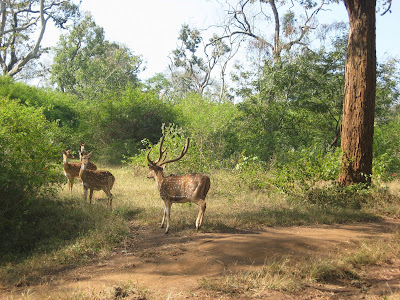


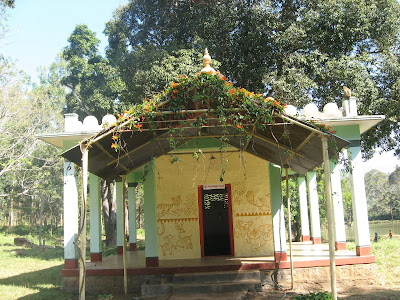




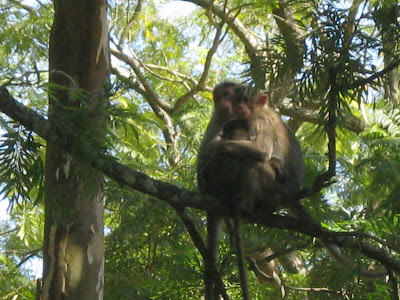
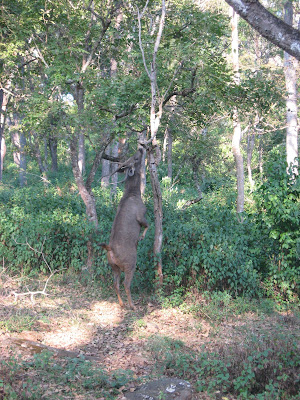
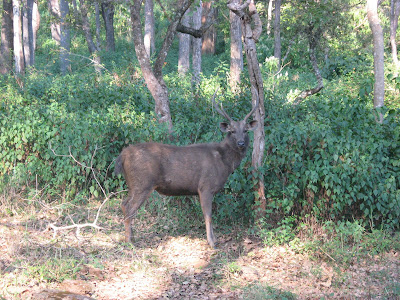




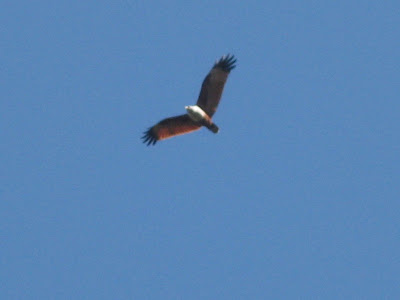


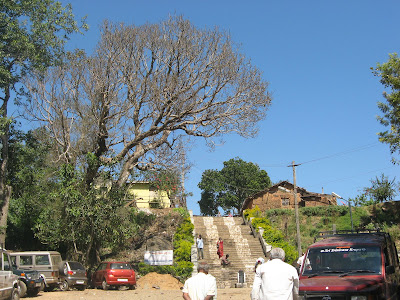












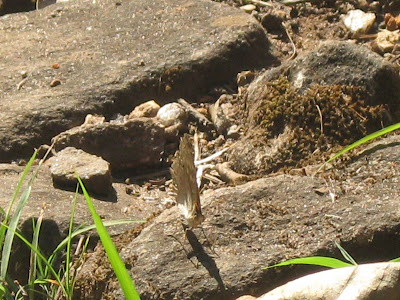



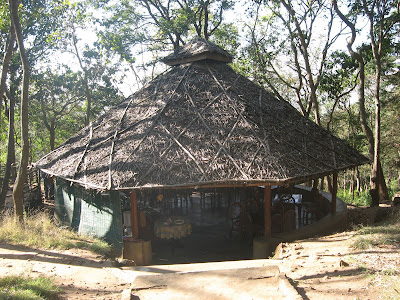
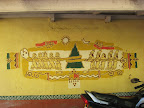


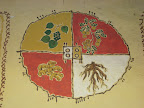





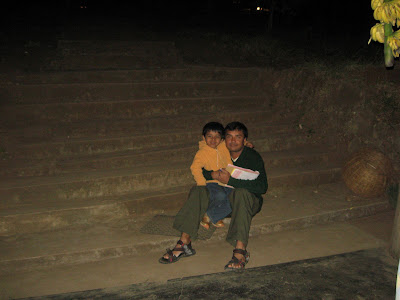



Lovely post
ReplyDeleteBR Hills JLR is the place where my love for JLR properties started at 2000. In fact few of JLR properties are the hunting lodges of Mysore Maharaja or his erstwhile masters the British.
When treking in BR Hills, try the offbeat route. First time, I was lucky as a new naturalist had taken charge and he wanted to see the various routes and the helpers there took us on a rell different / core zone route. Another thing you can do is get the ranger permission and try riding on the road upto temple in night or go with the elephant mahouts in the morning to bring back the elephants to the camp which they release in the evening. It is real interesting when the mahouts hide behind trees and call out to the elephants which are with their wild mates.
you can see some of my bandipur mudumalai wildlife / bird pictures at http://www.wildlifesanctuaryindia.com/wildlife/
Best regards
Bala
Hi Bala,
ReplyDeleteTHat sounds really interesting.. next time, i shall certainly ask about all that...
Thanks for the information
Anu
Nice description and pictures of the jungles and the wildlife.
ReplyDeleteYou have a beautiful blog and the posts and pictures give a vivid description of your experiences.
ReplyDeleteBR Hills is very special to us. We have been there about 10-12 times and that's where we saw our first tiger in the wild.
Hi Anu, the blog is lovely.. pretty pictures. I'm inspired to go to the Jungle lodge now... Thanks for sharing!
ReplyDeleteLovely post and with your permission, we have uploaded it on JLR blog -pls do take a look -http://junglelodges.blogspot.com
ReplyDeleteWhat a wonderful documentary of your jungle safari. That is one thing I would like to do. I really liked your pictures and the one of riding the elephant reminded me of my one elephant ride at King's Island, an amusement park in Cincinnati, Ohio USA.
ReplyDeleteThanks Karen... for the real experience you MUST come to India.....
ReplyDeleteAnu